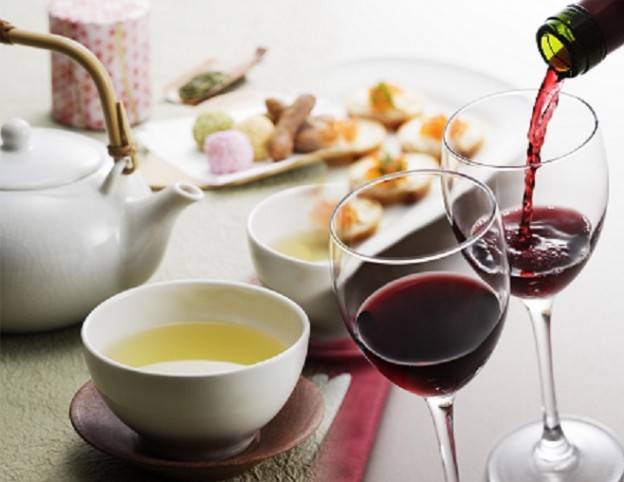At first glance, tea and wine seem very different. Wine is made and stored as a liquid; tea is made and stored in the form of dried leaves. Wine is best aged while tea can be drunk fresh. Wine is served cold or at room temperature in a glass; tea is usually served hot in a ceramic cup. The temperature at which wine served is critical; tea can be served over a great range of temperature without losing its flavor. However, if we look at the art of wine tasting and compare it to the art of tea tasting, there are interesting similarities.
Both tea and wine are judged by their appearance. In both, color and clarity are important. In both, the aroma is an important feature, as is the sensation that the liquid produces in the mouth. In wine, the final aspect of the flavor is called the “finish.” the quality that the wine leaves behind in the mouth. In tea, people pay attention to the “aftertaste,” the feeling and taste that may linger for hours after the last cup is finished.
Wine comes from the yeast fermentation of whole grapes. The result is a great richness and complexity, both of scent and taste. However, in the same bottle of wine, the taste hardly varies from beginning to end. Tea “fermentation” is the enzymatic oxidation of the leaves; even the most complex scents and flavors are simpler than those of wine. But these flavors change and develop from steeping to steeping, so that the experience of tea over time is much more complex.
Wine is assertive; it comes to you and presents itself. Tea is reserved; you have to cultivate its acquaintance to know it in depth. Wine leads to disinhibition, spontaneity, and drunkenness. Tea leads to clarity, mindfulness, and awakening.
Traditionally, tea can be enjoyed in solitude. Wine is enjoyed in company.
Tea plays an important part in Buddhism. It was used to help monks stay awake while meditating, and in turn monks became some of the most important cultivators of tea. Wine is associated with Mediterranean religions; Catholic monasteries were centers of grape growing and wine making. Wine leads to ecstasy; tea leads to awakening. Wine helps you escape the world while tea helps you awaken to it. When you drink too much wine, tea can help you recover.
Tea and wine appeal to different people in different ways and at different times. Both are gifts of nature that have been refined and transformed by human cultivation, and that have transformed the societies that cultivate them.
Excerpt from The Essence of Tea by Shan-Tung Hsu
If you enjoyed this post, please subscribe and share.

